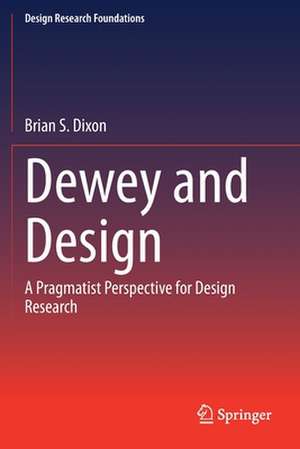Dewey and Design: A Pragmatist Perspective for Design Research: Design Research Foundations
Autor Brian S. Dixonen Limba Engleză Paperback – 2 iul 2021
| Toate formatele și edițiile | Preț | Express |
|---|---|---|
| Paperback (1) | 777.20 lei 6-8 săpt. | |
| Springer International Publishing – 2 iul 2021 | 777.20 lei 6-8 săpt. | |
| Hardback (1) | 783.20 lei 6-8 săpt. | |
| Springer International Publishing – 2 iul 2020 | 783.20 lei 6-8 săpt. |
Preț: 777.20 lei
Preț vechi: 947.80 lei
-18% Nou
Puncte Express: 1166
Preț estimativ în valută:
148.76€ • 153.30$ • 125.59£
148.76€ • 153.30$ • 125.59£
Carte tipărită la comandă
Livrare economică 04-18 martie
Preluare comenzi: 021 569.72.76
Specificații
ISBN-13: 9783030474737
ISBN-10: 3030474739
Ilustrații: XI, 200 p. 11 illus.
Dimensiuni: 155 x 235 mm
Greutate: 0.3 kg
Ediția:1st ed. 2020
Editura: Springer International Publishing
Colecția Springer
Seria Design Research Foundations
Locul publicării:Cham, Switzerland
ISBN-10: 3030474739
Ilustrații: XI, 200 p. 11 illus.
Dimensiuni: 155 x 235 mm
Greutate: 0.3 kg
Ediția:1st ed. 2020
Editura: Springer International Publishing
Colecția Springer
Seria Design Research Foundations
Locul publicării:Cham, Switzerland
Cuprins
Preface.- Acknowledgements.- Chapter 1. Design, Pragmatism and Dewey.- Chapter 2. Valuing Experience.- Chapter 3. Knowing in Making.- Chapter 4. Making Things Meaningful.- Chapter 5. Making Things Better.- Chapter 6. Making as Remaking.- Chapter 7. Dewey’s Pragmatism as a Philosophy for Design Research.- References.- Index.
Notă biografică
Dr Brian Dixon (PhD; MA; BA) is Course Director for MFA Design at the Belfast School of Art, Ulster University. His research interests cohere around: the relevance of practice-orientated philosophies (e.g. pragmatism) for design research; the roles of design in human spatial understanding; and design pedagogy. He holds a PhD in Information Design from University of the Arts London, combined with a practice background in visual communications. He has published widely, with his work appearing in major journals such as Design Issues, CoDesign and Design Management. He is currently co-investigator on the AHRC-funded Design Innovation and Land Assets project, which will feed into a broader arts and humanities based exploration of landscape decision-making in the UK.
Textul de pe ultima copertă
Over the last four decades, John Dewey’s pragmatist philosophy has formed an intellectual core in design research, underpinning Donald Schön’s theory of reflective practice, the experiential perspective in HCI and the democratic commitments of participatory design. Taking these existing connections as a starting point, Brian Dixon explores how deeper alignments may be drawn between Dewey’s insights and contemporary design research’s concern with practice, meaning and collaboration. Chapter by chapter, a fresh intellectual approach is revealed, one which recognises the transformative power of doing, making and knowing as a force for positive change in the world. We see that, for Dewey, experience comes first. It connects us to surrounding world and the society of which we are part; good things can happen and new realities are possible—we just have to work for them. The implications for design research are vast. We are offered a new way of understanding designerly knowledge production, as well as the methodological implications of adopting Deweyan pragmatism in design research. Taken as a whole, Dewey and Design not only draws out the value of Dewey’s work for design research but also, crucially, offers a clear articulation of the value of design itself.
Caracteristici
Explains theory of design research via pragmatist philosophy Offers introduction to Dewey for design researchers Highly relevant for interaction design, product design, and participatory design




























